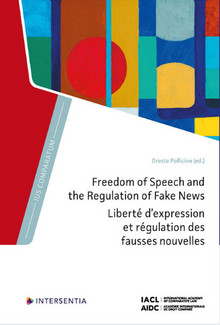Pierre Trudel, "Freedom of Speech and the Regulation of Fake News in Canada - Compliance with the Truth is not a Condition of Protection", in Oreste Pollicino (ed.) Freedom of Speech and the Regulation of Fake News, Cambridge (U-K), Intersentia, 2023, pp. 73-84.
In Canada, the protection of freedom of expression prevents laws from prohibiting the dissemination of statements that do not conform to the ‘truth’. Such prohibitions must be carefully justified and, above all, limited to misleading statements published intentionally and knowingly. Bans should not apply to opinions or statements published in good faith. It should be borne in mind that there are other provisions, protecting the reputation of individuals and prohibiting hate speech, which may apply in order to counter the dissemination of untruthful remarks with regard to an election candidate, or a person otherwise involved in the political process.
The constitutional protection of expressive freedoms leaves little latitude to public authorities to prohibit the dissemination of ‘false’ or ‘misleading’ statements. To fight misinformation effectively, we need to build the capacity to demand accountability from those in control of connected spaces. In these virtual spaces, information spreads according to commercial calculations constantly measuring what attracts the attention of users.
With a General Report by Oreste Pollicino (University of Bocconi, Italy) and Special Reports by Giuseppe B. Abbamonte (European Commission), Elke Cloots (University of Antwerp, Belgium), Peter Coe (University of Birmingham, United Kingdom), Nicolae-Dragos Costescu (University of Bucharest, Romania), Tat Dung Dang (Hochiminh City University of Law, Vietnam), Paula Gori (European University Institute), Leslie Gielow Jacobs (University of the Pacific, United States), Sarah Lambrecht (Constitutional Court of Belgium; University of Antwerp, Belgium), Elena Lazar (University of Bucharest, Romania), Li Yi (University of Macau, Macao (China)), Michela Manetti (University of Siena, Italy), Eijiro Mizutani (Kansai University, Japan), Erdem Iker Multu (Hacettepe University, Türkiye), Riku Neuvonen (Tampere University, Finland), Rostam J. Neuwirth (University of Macau, Macao (China)), Gábor Polyák (Eötvös Loránd University, Hungary), Dalida Rittossa (University of Rijeka, Croatia), Marissabell Škorić (University of Rijeka, Croatia), Pierre Trudel (University of Montreal, Canada), Pauline Türk (Université Côte d’Azur, France), Onur Uraz (Hacettepe University, Türkiye) and Eva Ellen Wagner (Johannes Gutenberg University Mainz, Germany).









